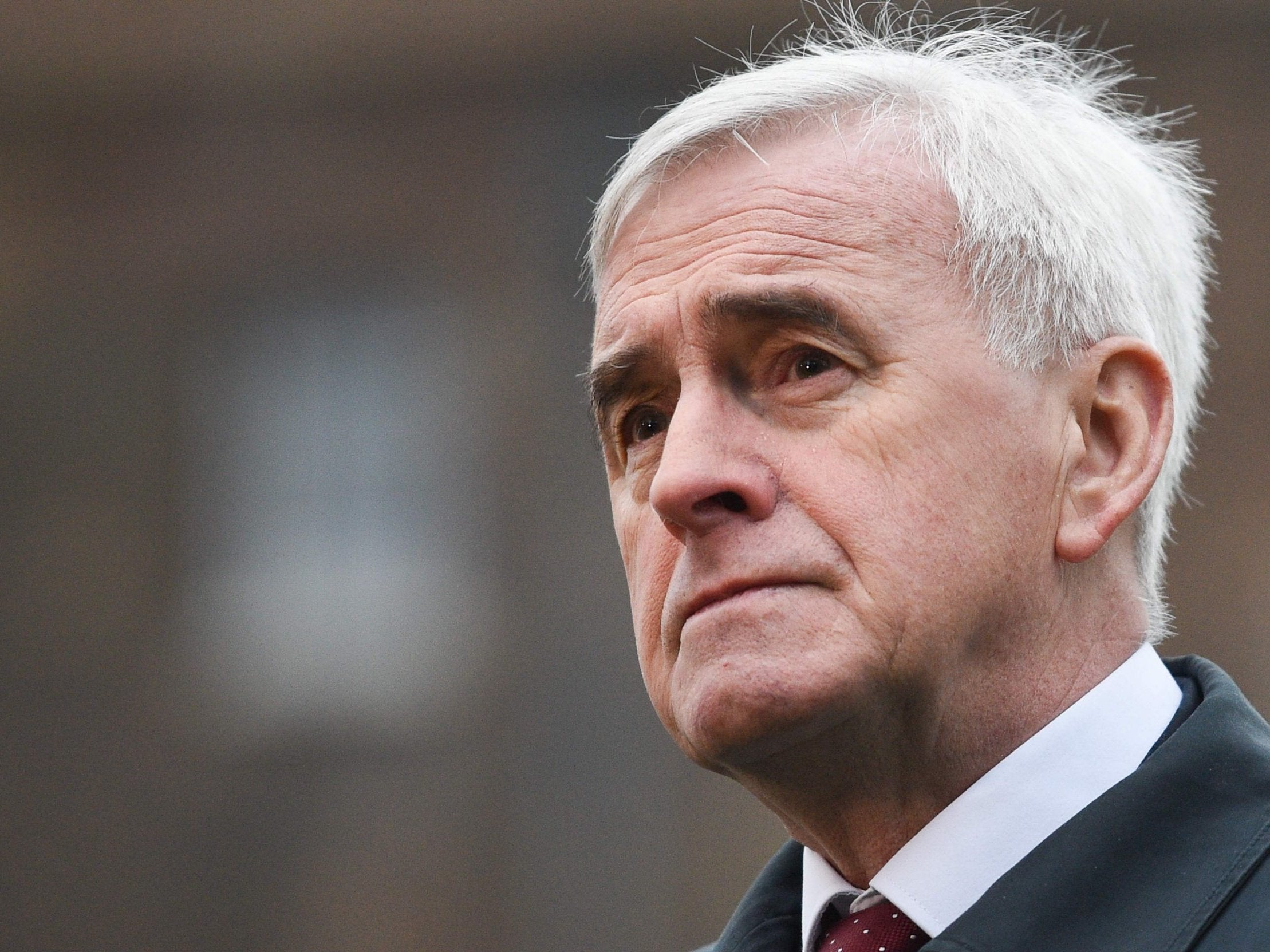Next Labour government to end the 'modern-day scourge' of in-work poverty, John McDonnell says
Report says household income squeeze is worst outside recession since records began

Your support helps us to tell the story
From reproductive rights to climate change to Big Tech, The Independent is on the ground when the story is developing. Whether it's investigating the financials of Elon Musk's pro-Trump PAC or producing our latest documentary, 'The A Word', which shines a light on the American women fighting for reproductive rights, we know how important it is to parse out the facts from the messaging.
At such a critical moment in US history, we need reporters on the ground. Your donation allows us to keep sending journalists to speak to both sides of the story.
The Independent is trusted by Americans across the entire political spectrum. And unlike many other quality news outlets, we choose not to lock Americans out of our reporting and analysis with paywalls. We believe quality journalism should be available to everyone, paid for by those who can afford it.
Your support makes all the difference.Shadow chancellor John McDonnell has committed the next Labour government to ending the “modern-day scourge” of in-work poverty within its first term in office, as new figures showed Britons are having to work harder and longer to maintain their incomes.
Typical household incomes fell by 0.5 per cent in real terms over the past two years, despite the UK population working more and curtailing their leisure time, found a report by the Resolution Foundation.
The squeeze on incomes between 2016/17 and 2018/19 was the worst experienced outside a recession since records began - and worse than during the recession of the early 1990s, the thinktank found.
The Living Standards Audit 2019 blamed the failure to boost productivity for a “stagnation” in living standards since the financial crisis of 2007/08. Improved output per hour had accounted for two-thirds of economic growth ahead of the crash, but only 22 per cent in the decade after it.
In the absence of productivity growth, households have shored up their incomes by working more, with employment three percentage points higher than in 2007.
And the long-term trend which saw the working week reduce by an hour every four years over the past century has now ground to a halt, with workers putting in an average 32 hours, just as they did in 2007.
The Foundation warned that households were “running out of road” in terms of opportunities to maintain income levels by working more, as the UK’s employment rate is already at its highest level since the Second World War.
Instead, the new prime minister arriving in Downing Street next week should seek to stimulate productivity and improve employment and earning opportunities for women.
Just as the expansion of paid maternity leave and free childcare improved family incomes by allowing more women to work, policies such as reforming Universal Credit to better support households’ second earners into employment will be needed in the coming years, said the report.
The Foundation’s senior economic analyst Adam Corlett said: “The living standards history of the past 25 years tells us that there are two broad ways that families have traditionally got richer over time – higher pay off the back of rising productivity, and supporting more women into work.

“After an unprecedented income squeeze over the past decade, and a living standards outlook that includes child poverty rising to record levels, an economic approach that supports higher incomes for all households must be the top domestic priority for the incoming PM.”
Mr McDonnell will use the launch of the Audit to announce Labour's new commitment to ending in-work poverty over the course of the next parliament, which is currently due to cover the years 2022-27, but could be brought forward by a snap election.
He will say: “The Joseph Rowntree Foundation said last year that ‘in-work poverty is the problem of our times’.
“I am committing today to ending this modern-day scourge, to eliminating in-work poverty by the end of Labour’s first full Parliamentary term.
”As Chancellor in the next Labour Government, I want you to judge me by how much we reduce poverty and how much we create a more equal society. By how much people’s lives change for the better. Because that is our number one goal.”

Mr McDonnell will say that Labour policies to introduce structural change to the economy, improve public services and reform social security will all be needed to meet the target of a “sustained eradication of poverty (and) dramatic narrowing of inequality”.
And he will confirm Labour’s rejection of the concept of “social mobility” which has underpinned the agendas of governments of all stripes over the past 40 years.
“Behind the concept of social mobility is the belief that poverty is OK as long as some people are given the opportunity to climb out of it, leaving the others behind,” he will say.
“I reject that completely, and want to see a society with higher living standards for everyone as well as one in which nobody lacks the means to survive or has to choose between life’s essentials.
“A rejection of the belief that it’s OK if your local factory closes, as long as you have cash transfers from the finance sector in the South-East or a new warehouse opening on the edge of town paying minimum wage on its zero-hour contracts.
“Ending poverty won’t just be done in the workplace: we need to make sure the essentials of life are never denied to people because of their circumstances.
“So parents aren’t forced to choose between feeding themselves and feeding their children or the unemployed teenager doesn’t give up on job interviews because they cost £5 in bus fares each time.
“We need a structurally different economy, a social safety net of shared public service provision, and of course a financial safety net as well.
“Without any one of these three elements, we will not be able to achieve the sustained eradication of poverty, the dramatic narrowing of inequality, and the transformation of people’s lives that will be the central purpose of the next Labour Government.”
Responding, Conservative Party chairman Brandon Lewis said: “Labour’s plans for the economy would lead to worse living standards and harm the people they claim they want to help the most.
“Just this week we have seen wages rise by their fastest in 11 years, giving people more money in their pockets, and record numbers of people getting the security of a wage.
“Thanks to our balanced approach, we’ve also cut taxes for 32 million people, taking millions of the lowest-paid out of paying income tax altogether, and taken action to reduce the cost of living”
Join our commenting forum
Join thought-provoking conversations, follow other Independent readers and see their replies
Comments